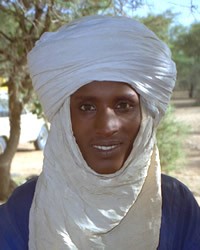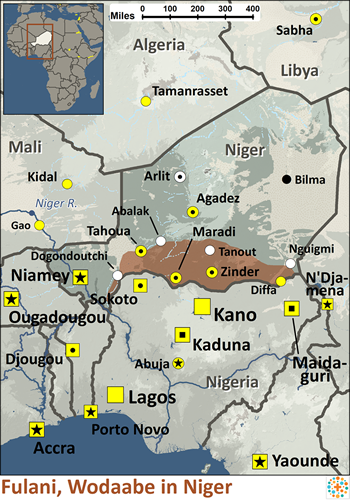The Fulani were first seen as a people group in the Senegambia Valley in the eleventh century. They travelled east and south of the Sahara Desert for about the next four hundred years. During the centuries, they have developed several subgroups, including the Wodaabe.
The Wodaabe keep their social distance from other Fulani groups. The Wodaabe believe they have their own customs that pre-date those of the other Fulani groups. Some call them the people of the taboos because they have their own taboos. They are nomads who live in the Sahara Desert in Niger.
The Wodaabe live in the bush. They have camels, donkeys, goats, and sheep. It's hard to find them as they often travel, and their tracks are not easily traceable in the loose sand.
Most of the Wodaabe look after cattle and do trading. They move about, looking for grazing land and water for their cattle. They live in grass huts or have no shelter. The men look after the cows and camels; the women look after the donkeys and cooking fire. The children look after the sheep and goats.
In the rainy season, the Wodaabe drink milk from the cows. They do not drink milk from the goats. During the long dry periods of the year, millet is their main food. They only eat the meat of their goats and sheep on special occasions.
The Wodaabe like long greetings when you meet them, followed by a tea ceremony. They are noted for being exuberant and friendly.
The Wodaabe are artistic and are famous for their dyed cloth. The women do the embroidery. They trade fabrics that sell for a high price not only in West Africa but in throughout the world.
The men dance during some of their festivals, which can last seven days. During the September Gerewol festival, Wodaabe women judge the attractiveness of potential husbands based on the whites of his eyeballs and teeth. The Wodaabe people are noted for their art and their unusual behavior. The Fulani moral code known as Pulaaku is weak among the Wodaabe.
The family of a potential Wodaabe bridegroom gives a bride price to the family of the bride before the wedding. The bride remains with her husband till she is pregnant and then lives in the home of her mother for three or four years. Parents cannot talk directly with their first and second-born children according to their taboos. These children are basically raised by their grandparents. Husbands and wives are not allowed to hold hands or show other signs of affection during daylight hours.
The Wodaabe people are noted for their art and their unusual behavior, such as beauty contests for the men.
The Wodaabe began to become Muslim in the 1500s when the scholar al-Maghili brought Islam to Fulani, Hausa and Tuareg leaders in northern Nigeria. Today, there are various degrees of orthodoxy among the Wodaabe people, but almost all of them still practice pre-Islamic religion.
The Wodaabe are among the poorest people in a poor area of Africa. They need more rain in their region if their cattle are going to be strong and healthy.
Because they are often nomadic, the Wodaabe are seldom reached by missionaries. Missionaries almost always focus on settled people groups. Missionary veterinarians could be very effective among this people group.
Pray for adequate rain as a testimony of God's power and love.
Pray for a strong core of Wodaabe believers to live righteous lives as a way to reach others for Christ.
Pray for the Wodaabe to have a firm belief in Christ's goodness and power so they will put their trust in him alone.
Pray for workers to go to the Wodaabe people until they have their own sustainable movement to Christ.
Scripture Prayers for the Fulani, Wodaabe in Niger.
| Profile Source: Joshua Project |

























